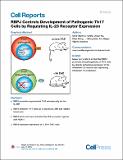RBPJ Controls Development of Pathogenic Th17 Cells by Regulating IL-23 Receptor Expression
Author(s)
Meyer zu Horste, Gerd; Wu, Chuan; Wang, Chao; Cong, Le; Pawlak, Mathias; Lee, Youjin; Elyaman, Wassim; Xiao, Sheng; Regev, Aviv; Kuchroo, Vijay K.; ... Show more Show less
DownloadHorste-2016-RBPJ Controls Develo.pdf (9.427Mb)
PUBLISHER_CC
Publisher with Creative Commons License
Creative Commons Attribution
Terms of use
Metadata
Show full item recordAbstract
Interleukin-17 (IL-17)-producing helper T cells (Th17 cells) play an important role in autoimmune diseases. However, not all Th17 cells induce tissue inflammation or autoimmunity. Th17 cells require IL-23 receptor (IL-23R) signaling to become pathogenic. The transcriptional mechanisms controlling the pathogenicity of Th17 cells and IL-23R expression are unknown. Here, we demonstrate that the canonical Notch signaling mediator RBPJ is a key driver of IL-23R expression. In the absence of RBPJ, Th17 cells fail to upregulate IL-23R, lack stability, and do not induce autoimmune tissue inflammation in vivo, whereas overexpression of IL-23R rescues this defect and promotes pathogenicity of RBPJ-deficient Th17 cells. RBPJ binds and trans-activates the Il23r promoter and induces IL-23R expression and represses anti-inflammatory IL-10 production in Th17 cells. We thus find that Notch signaling influences the development of pathogenic and non-pathogenic Th17 cells by reciprocally regulating IL-23R and IL-10 expression.
Date issued
2016-06Department
Massachusetts Institute of Technology. Department of BiologyJournal
Cell Reports
Publisher
Elsevier
Citation
Meyer zu Horste, Gerd; et al. "RBPJ Controls Development of Pathogenic Th17 Cells by Regulating IL-23 Receptor Expression" Cell Reports, 16, no. 2 (2016 July): 392-404.
Version: Final published version
ISSN
2211-1247